河北科技师范学院
毕业论文(设 计)外文资料及译文
题
目:交通灯信号控制器设计
学 生 姓名:张亚芹
指 导 教师:陈爽
系(院)别:数学与信学科技学院
专业、班级:计算机科学与技术 0703 班
完 成 时间:2011 年 3 月 10 日
河北科技师范学院教务处制
1
�
[单击输入资料下载的网址或书籍名称等]
Intelligent Control
Control technology is 20 years in the last century established a frequency domain
method based upon the classical control theory developed, the control technology of
industrial production has been widely used. Promote the development of space technology,
the 50's emerged to law-based state space control theory now so widely control technology
development, resulting in more applications. Since the 60s, with the development of
computer technology, many new methods and technology into engineering, product of stage,
appears to accelerate the pace of industrial technological upgrading, which control
technology presented new challenges, also provide for the development of a conditions
for the theory of intelligent control technology application in the form of intelligent
control technology.
Intelligent control technology is mainly used to resolve those using traditional
methods can not solve the control problem of complex systems, such as intelligent robotics
systems, computer integrated manufacturing system (CIMS), a complex industrial process
control systems, aerospace control systems, socio-economic management systems,
transportation systems, communication network systems, environmental protection and
energy systems. These complex systems have the following characteristics: 1. Control
object of serious uncertainty, the control model or the model structure and unknown
parameters of a large range of changes; 2. Control of highly nonlinear characteristics
of the object; 3. Control tasks require complex. For example, the intelligent robot
systems require a complex task system has its own planning and decision-making capacity,
automatic ability to avoid obstacles to reach the destination.
Intelligent control technology often play a role through the intelligent control
system. In short, intelligent control system is the system with an intelligent behavior,
which uses artificial intelligence methods to solve difficult mathematical methods
accurately describe the complex, random, flexible control problem, a self-learning,
adaptive, self-organizing capabilities. Its main objective is to explore the human brain
deal with things closer to the "thinking" mode is to study a kind of mathematical logic,
make the machine like human beings, according to a small amount of fuzzy information,
some of the reasoning based on the guidelines, "thinking", you can get a very accurate
or adequate approximation of the conclusions and control strategies.
The intelligent control technology in the engineering machinery products, to solve
the traditional control methods can not well adapt to changing challenges of complex
objects. Intelligent control technology can change the control strategy to adapt to the
1
�
object complexity and uncertainty. It is not just rely on mathematical models, and online
experience based on knowledge and reasoning to identify and select the best control
strategy, the uncertainty for the system to maintain a predetermined quality and
expectations.
Intelligence and intelligent systems can be characterized in a number of ways and
along a number of dimensions. There are certain attributes of intelligent systems, common
in many definitions, which are of particular interest to the control community.
In the following, several alternative definitions and certain essential
characteristics of intelligent systems are first discussed. A brief working definition
of intelligent systems that captures their common characteristics is then presented.
In more detail, we start with a rather eneral definition of intelligent systems, we
discuss levels of intelligence, and we explain the role of control in intelligent systems
and outline several alternative definitions. We then discuss adaptation and learning,
autonomy and the necessity for efficient computational structures in intelligent systems,
to deal with complexity. We conclude with a brief working characterization of intelligent
(control) systems.
We start with a general characterization of intelligent systems:
An intelligent system has the ability to act appropriately in an uncertain
environment, where an appropriate action is that which increases the probability of
success, and success is the achievement of behavioral subgoals that support the system’s
ultimate goal.
In order for a man-made intelligent system to act appropriately, it may emulate
functions of living creatures and ultimately human mental faculties. An intelligent
system can be characterized along a number of dimensions. There are degrees or levels
of intelligence that can be measured along the various dimensions of intelligence. At
a minimum, intelligence requires the ability to sense the environment, to make decisions
and to control action. Higher levels of intelligence may include the ability to recognize
objects and events, to represent knowledge in a world model, and to reason about and
plan for the future. In advanced forms, intelligence provides the capacity to perceive
and understand, to choose wisely, and to act successfully under a large variety of
circumstances so as to survive and prosper in a complex and often hostile environment.
Intelligence can be observed to grow and evolve, both through growth in computational
power and through accumulation of knowledge of how to sense, decide and act in a complex
and changing world.
The above characterization of an intelligent system is rather general. According
to this, a great number of systems can be considered intelligent. In fact, according
2
�
to this definition, even a thermostat may be considered to be an intelligent system,
although of low level of intelligence. It is common, however, to call a system intelligent
when in fact it has a rather high level of intelligence.
There exist a number of alternative but related definitions of intelligent systems
and in the following we mention several. They provide alternative, but related
characterizations of intelligent systems with emphasis on systems with high degrees of
intelligence.
The following definition emphasizes the fact that the system in question processes
information, and it focuses on man-made systems and intelligent machines:
A. Machine intelligence is the process of analyzing, organizing and converting data
into knowledge; where (machine) knowledge is defined to be the structured information
acquired and applied to remove ignorance or uncertainty about a specific task pertaining
to the intelligent machine. This definition leads to the principle of increasing
precision with decreasing intelligence, which claims that: applying machine intelligence
to a database generates a flow of knowledge, lending an analytic form to facilitate
modeling of the process.
Next, an intelligent system is characterized by its ability to dynamically assign
subgoals and control actions in an internal or autonomous fashion:
B. Many adaptive or learning control systems can be thought of as designing a control
law to meet well-defined control objectives. This activity represents the system’s
attempt to organize or order its “knowledge” of its own dynamical behavior, so to meet
a control objective. The organization of knowledge can be seen as one important attribute
of intelligence. If this organization is done autonomously by the system, then
intelligence becomes a property of the system, rather than of the system’s designer. This
implies that systems which autonomously (self) -organize controllers with respect to
an internally realized organizational principle are intelligent control systems.
A procedural characterization of intelligent systems is given next:
C. Intelligence is a property of the system that emerges when the procedures of
focusing attention, combinatorial search, and generalization are applied to the input
information in order to produce the output. One can easily deduce that once a string
of the above procedures is defined, the other levels of resolution of the structure of
intelligence are growing as a result of the recursion. Having only one level structure
leads to a rudimentary intelligence that is implicit in the thermostat, or to a
variable-structure sliding mode controller.
The concepts of intelligence and control are closely related and the term “Intelligent
Control” has a unique and distinguishable meaning. An intelligent system must define and
3
�
use goals. Control is then required to move the system to these goals and to define such
goals. Consequently, any intelligent system will be a control system. Conversely,
intelligence is necessary to provide desirable functioning of systems under changing
conditions, and it is necessary to achieve a high degree of autonomous behavior in a
control system. Since control is an essential part of any intelligent system, the term
“Intelligent Control Systems” is sometimes used in engineering literature instead of
“Intelligent Systems” or “Intelligent Machines”. The term “Intelligent Control System”
simply stresses the control aspect of the intelligent system.
Below, one more alternative characterization of intelligent (control) systems is
included. According to this view, a control system consists of data structures or objects
(the plant models and the control goals) and processing units or methods (the control
laws) :
D. An intelligent control system is designed so that it can autonomously achieve
a high level goal, while its components, control goals, plant models and control laws
are not completely defined, either because they were not known at the design time or
because they changed unexpectedly.
There are several essential properties present in different degrees in intelligent
systems. One can perceive them as intelligent system characteristics or dimensions along
which different degrees or levels of intelligence can be measured. Below we discuss three
such characteristics that appear to be rather fundamental in intelligent control systems.
Adaptation and Learning. The ability to adapt to changing conditions is necessary
in an intelligent system. Although adaptation does not necessarily require the ability
to learn, for systems to be able to adapt to a wide variety of unexpected changes learning
is essential. So the ability to learn is an important characteristic of (highly)
intelligent systems.
Autonomy and Intelligence. Autonomy in setting and achieving goals is an important
characteristic of intelligent control systems. When a system has the ability to act
appropriately in an uncertain environment for extended periods of time without external
intervention, it is considered to be highly autonomous. There are degrees of autonomy;
an adaptive control system can be considered as a system of higher autonomy than a control
system with fixed controllers, as it can cope with greater uncertainty than a fixed
feedback controller. Although for low autonomy no intelligence (or “low” intelligence)
is necessary, for high degrees of autonomy, intelligence in the system (or “high” degrees
of intelligence) is essential.
Structures and Hierarchies. In order to cope with complexity, an intelligent system
must have an appropriate functional architecture or structure for efficient analysis
4
�
and evaluation of control strategies. This structure should be “sparse” and it should
provide a mechanism to build levels of abstraction (resolution, granularity) or at least
some form of partial ordering so to reduce complexity. [7] An approach to study
intelligent machines involving entropy emphasizes such efficient computational
structures. Hierarchies (that may be approximate, localized or combined in heterarchies)
that are able to adapt, may serve as primary vehicles for such structures to cope with
complexity. The term “hierarchies” refers to functional hierarchies, or hierarchies of
range and resolution along spatial or temporal dimensions, and it does not necessarily
imply hierarchical hardware. Some of these structures may be hardwired in part. To cope
with changing circumstances, the ability to learn is essential, so these structures can
adapt to significant, unanticipated changes.
In view of the above, a working characterization of intelligent systems (or of (highly)
intelligent (control) systems or machines) that captures the essential characteristics
present in any such system is:
An intelligent system must be highly adaptable to significant unanticipated changes,
and so learning is essential. It must exhibit high degree of autonomy in dealing with
changes. It must be able to deal with significant complexity, and this leads to certain
sparse types of functional architectures such as hierarchies.
智能控制
控制技术是在上世纪 20 年代建立了以频域法为主的经典控制理论后发展起来的,控制技术首先在
工业生产中得到了广泛的应用。在空间技术发展的推动下,50 年代又出现了以状态空间法为主的现在
控制理论,使控制技术得到了广泛的发展,产生了更多的应用领域。60 年代以来,随着计算机技术的发
展,许多新方法和技术进入工程化,产品化阶段,显得加快了工业技术更新的步伐,这对自动控制技术提
出了新的挑战,也为其发展提供了条件,促进了智能理论在控制技术中的应用,形成了智能控制技术。
智能控制技术主要用来解决那些用传统的方法难以解决的复杂系统的控制问题,如智能机器人系
统,计算机集成制造系统(CIMS),复杂的工业过程控制系统,航天航空控制系统,社会经济管理系统,
交通运输系统,通信网络系统,环保与能源系统等。这些复杂系统具有以下特点:1.控制对象存在严重
的不确定性,控制模型未知或模型的结构和参数在很大的范围内变化; 2.控制对象具有高度的非线性
特征; 3.控制任务要求复杂。例如,在智能机器人系统中,要求系统对一个复杂的任务具有自行规划和
决策的能力,有自动躲避障碍达到目的地的能力。
智能控制技术通常通过智能控制系统发挥作用。简单地说,智能控制系统是指具备一个智能行为的
系统,它利用人工智能的方法能够解决难以用数学的方法精确描述的复杂的,随机的,柔性的控制问题,
具有自学习,自适应,自组织的能力。它的主要目标是探索更加接近人类大脑处理事物的“思维”模式,
也是研究一种数理逻辑,能使机器像人一样,根据少量模糊信息,依据一定的推理准则进行“思维”,就
可以得出相当准确的或足够近似的结论和控制策略。
把智能控制技术应用在工程机械产品上,解决了传统控制方法无法很好的适应多变复杂对象的难
5
�
题。智能控制技术可以改变控制策略去适应对象的复杂性和不确定性。它不是仅依靠数学模型,而且根
据知识和经验进行在线推理,确定并优选最佳的控制策略,针对某种不确定性使系统保持预定的品质和
期望的目标。
智力与智能系统的特点可以通过多种方式和多个方面来描述。有很多智能系统属性,在许多定义
中有共同点,其中特别关注的是社会的控制。
在下面,智能系统的几个替代的定义和一些基本特征首先被讨论。一个简短的定义智能系统捕捉
他们的共同特点,然后介绍。在更多的细节,我们从智能系统的常规定义开始,详细地讨论智能的水
平,说明智能系统中控制的作用,并概述几种不同的定义。然后,我们讨论适应和学习,自主性和高
效率的计算结构的必要性,智能系统,以应付复杂性。我们用一个简短的工作总结表征智能(控制)
系统。
我们以智能系统的一般特征开始。
智能系统具有在不确定环境中正确反应的能力,正确的反应则增加了成功的几率,从而实现了支
持系统终极目标的子目标。
为了使人造智能系统行动适当,它可能会模拟人类生物的功能,并最终脑力。一个智能系统可沿
着特征维数。有学位或智力水平,可以沿来衡量智力的各个方面。至少,情报要求能够感知环境,作
出决策和控制的行动。更高水平的智能应包括能够识别物体和事件的能力,以代表在世界模型中的知
识,并考虑将来可能的原因和计划。在高级的形式中,智能在各种环境条件下都具有认识和理解及正
确地选择和反应的能力,从而能在复杂而且通常不利的环境中得到持续发展。智能可通过计算能力的
增长,并通过在一个复杂和不断变化的世界中对意识如何,决定和采取行动的知识的积累来观察到增
长和发展。
一个智能系统的上述特性是相当普遍。根据这一点,大量的系统可以被视为聪明。事实上,根据
这一定义,甚至一恒温器可被视为是一个智能系统,虽然智力低的水平。它是常见的,然而,在实际
中有一个相当高的水平智能才能称为智能系统。
存在着一个智能系统和其他相关的一些定义,但下面我们提到几个。它们提供了的选择,但都是
同高度重视的高水平的智能系统相关的。
下面的定义强调一个在问题进程信息的系统,该系统重点强调人造系统和智能机器:
A.机器智能是个分析,组织和数据转换成知识的过程;其中知识定义为结构化信息获取和适用于
消除无知或有关特定任务有关的不确定性的智能机器。由这一定义产生了以较低的智能达到较高精度
的原则,但要求应用于数据库的机器智能构造一个知识库,从而提供一种便于对象建模的解析形式。
接下来,一个智能系统是以它能够动态地分配和在内部或自主地控制行动的能力而被定义:
B.许多自适应或者学习型控制系统可以被看作是一个控制律设计以满足明确的控制目标。这项活
动代表了系统的筹组或命令其“自身的动力学行为的知识”,因此,以满足控制目标,该知识的组合可
以被视为智能一个重要的属性。如果这组织是由系统自主完成,然后变成了智力系统的财产,而不是
系统的设计者。这是表示,就内部实现的结构原理而言,控制器能高度自组织的系统属于智能控制系
统。
一个智能系统的程序特征如下:
6
�
C.智能是个系统的财产,该系统在当出现财产集中的程序,组合搜索,并推广应用到输入的资料,
以产生输出。人们可以很容易推断,一旦上述程序字符串的被定义,另一个决定智能结构的水平是作
为一个趋势的结果递归增长。只有一个层次结构,导致了一个初步的智能,是个隐含的自动调温器,
或一个可变结构滑模控制器。
智能和控制的概念是密切相关的,所谓“智能控制“具有独特的意义和区别。一个智能系统必须
定义和使用目标。然后,需要控制移动系统实现这些目标,并确定这些目标。因此,任何一个智能系
统将控制系统。相反,智力要不断变化的条件下提供理想的系统运作,这是要实现在一个控制系统的
高度的自主行为所必须的。是由于控制是任何一个智能系统的重要组成部分,所谓“智能控制系统”,
有时用于工程文献,而不是“智能系统”或“智能机”。该术语“智能控制系统”只是强调了智能系
统的控制方面。
下面,更多的智能(控制)系统选择的特征是包括在内。根据这种观点,一个控制系统包括数据
结构或对象(工厂模式和控制目标)和加工单位或方法(对照法):
D.是智能控制系统设计上,它可以自主实现高层次的目标,而它的组成部分,控制目标,植物模
型和控制规律并没有彻底的定义,是因为它们在设计时不知道或者是因为他们意外的改变。
智能系统具有若干个不同层次的基本属性。人们可以根据能被度量的不同程度来将其
看成是智能系统的特性或程度。下面我们讨论三种这样的特点,这似乎是智能控制系统中相当基
础的。
适应和学习。对一个智能系统来说,能够适应不断变化的条件是必要的。虽然并不一定需要获得
学习的能力,为系统能够适应,学习是至关重要的。因此,学习能力是一个(高度)智能系统的重要
特征。
自动与智能。在制定和实现目标的时候,自动是一个重要的智能控制系统的特点。当一个系统有
能力采取适当的行为在对于长时间没有外来干预的不确定的环境下,它是被认为是高度自治。有程度
的自治;一套自适应控制系统可被视为更高的自动系统,一个高于固定控制器,控制系统作为自治制度
它可以应付大于固定反馈控制器的不确定性。虽然自主性低没有智慧(或“低”情报)是必要的,高
程度的自治,对于智能系统(或“高”智力度)是至关重要的。
结构和层次结构。为了应付复杂性,智能系统必须有一个适当的功能结构或有效的分析和评价结
构控制策略。这一结构应该是稀疏的,并且提供一种机制来确定概括(分辨率、尺度)的标准,或至
少是某些形式的局部分类,以降低复杂程度。
用一种方法来研究,涉及到智能机器所强调这种高效的计算机结构。层次结构(即可能是近似的,
局部或联合的层次),它们能够适应,为这一结构可作为主要工具,以应付复杂性。所谓“层次”是
指功能等级,或等级和范围以及空间或时间方面的决议,它不一定意味着等级的硬件。这些结构可能
是一些硬部分。至配合不断转变的情况下,学习能力是必要的,所以这些结构可以适应重大的,意想
不到的变化。
鉴于上述,智能系统((或高)智能(控制)系统或机器)的一个工作性的特征,这个特征会出现
在任何现有基本特征。这个特征是:
一个智能系统必须高度适应重大意外变化,因此学习是必要的。它必须表现出在处理与变化,高度
7
�
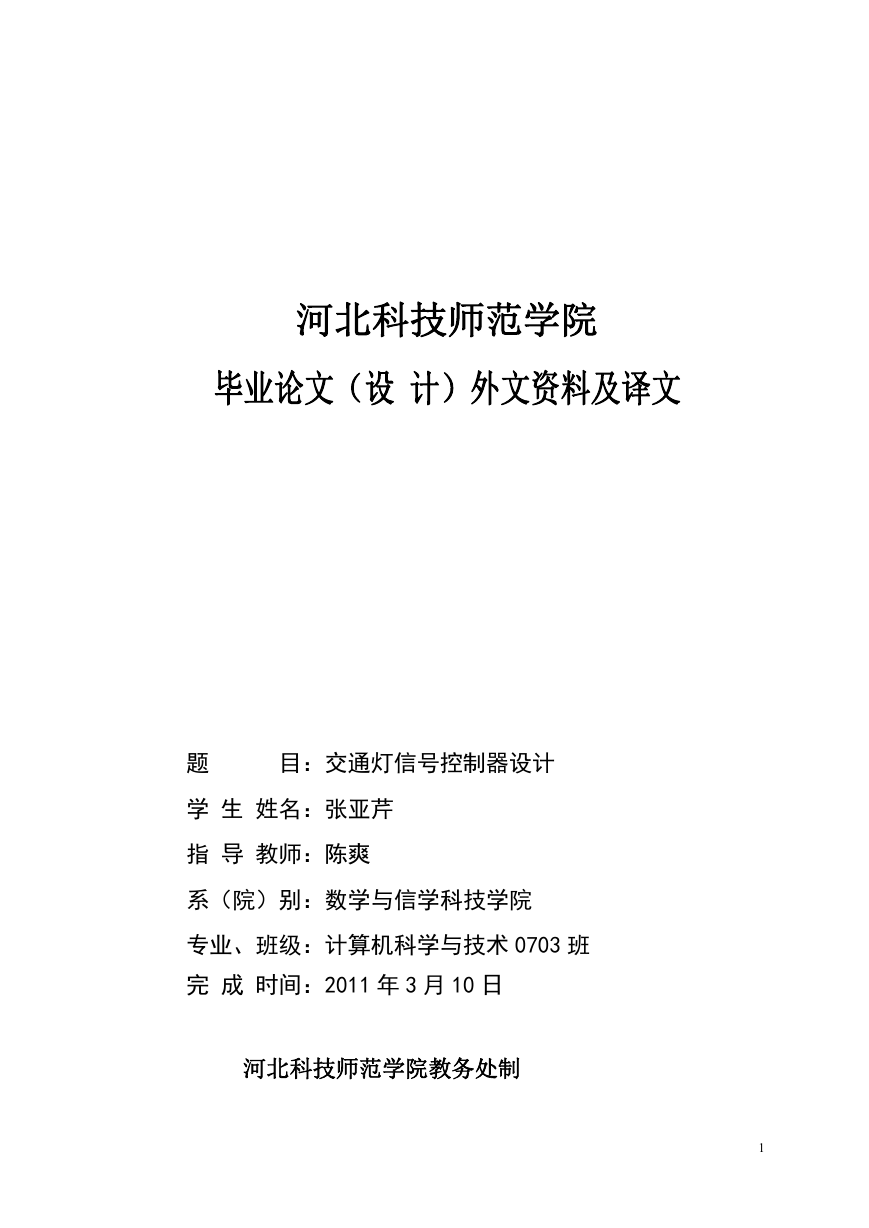
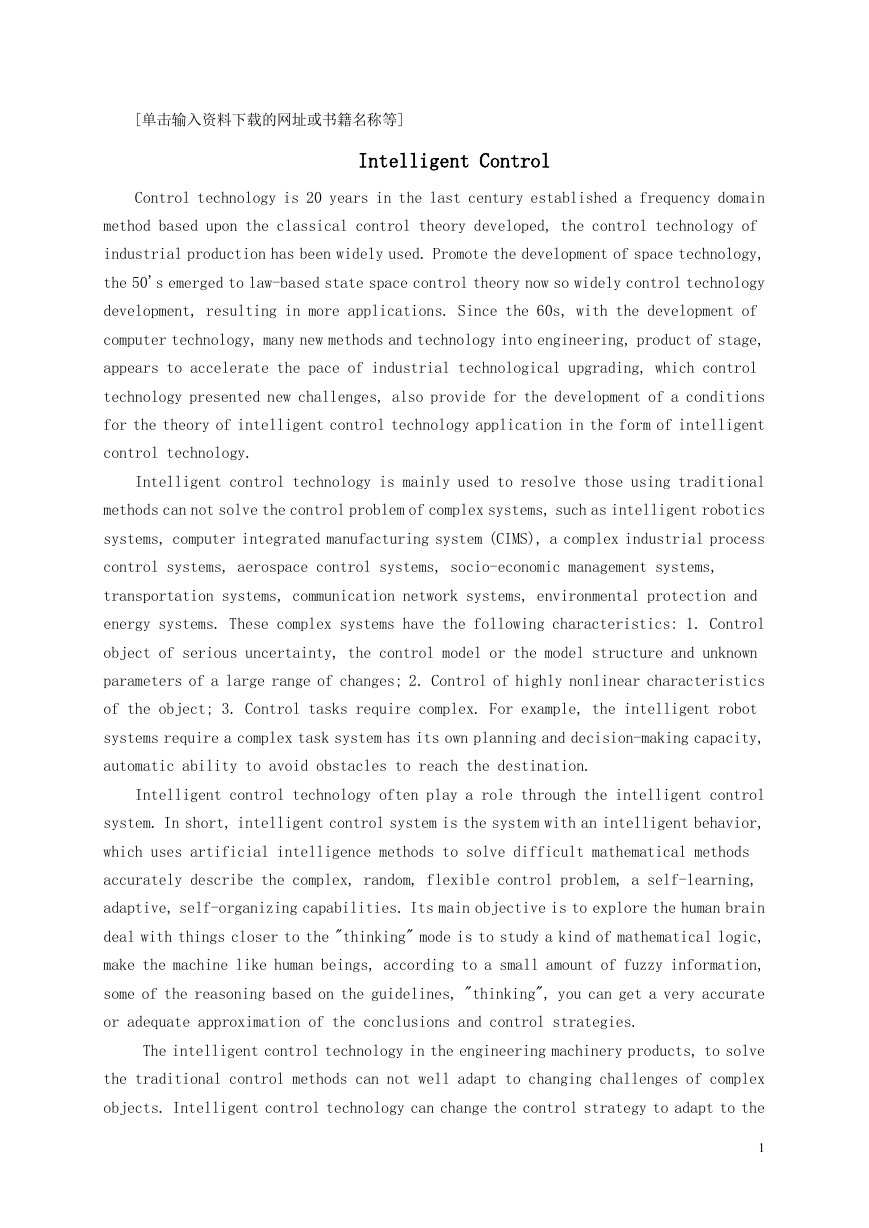
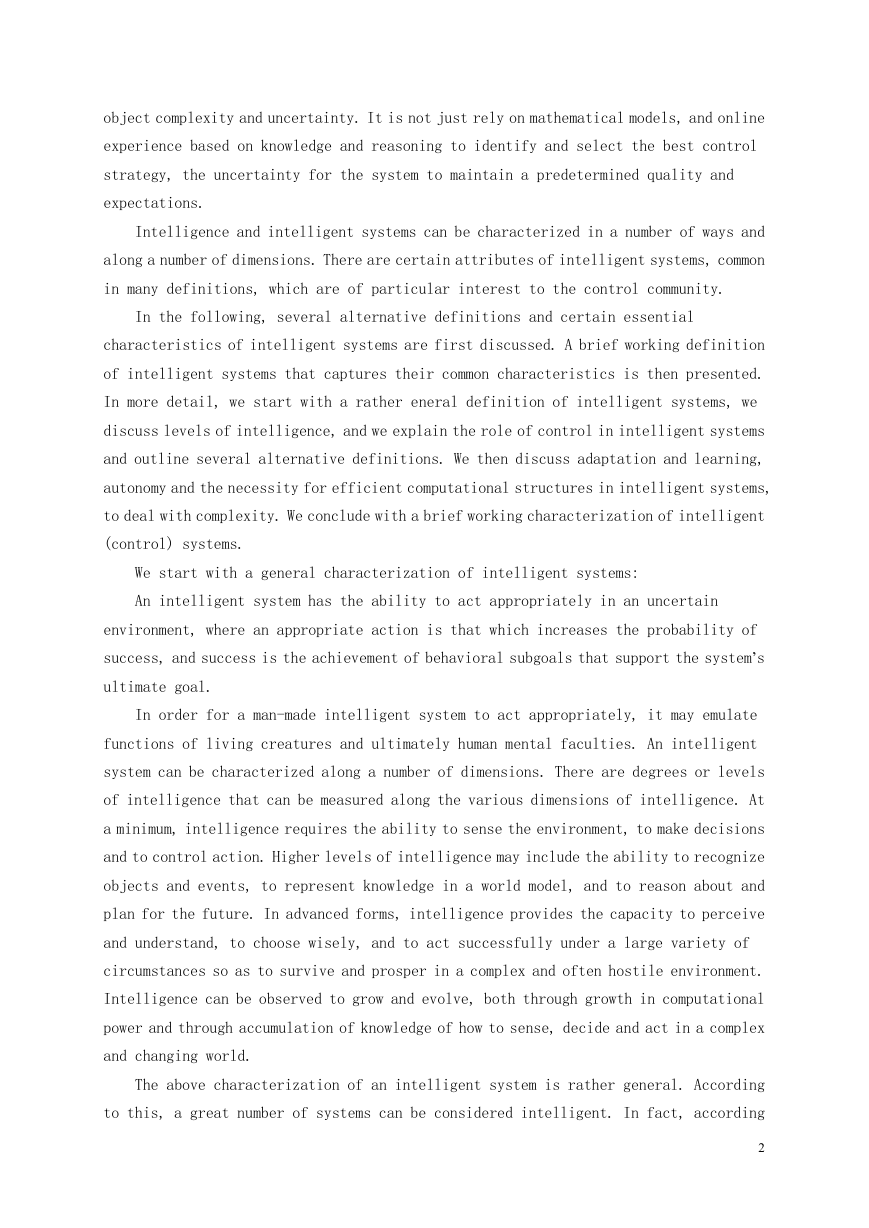
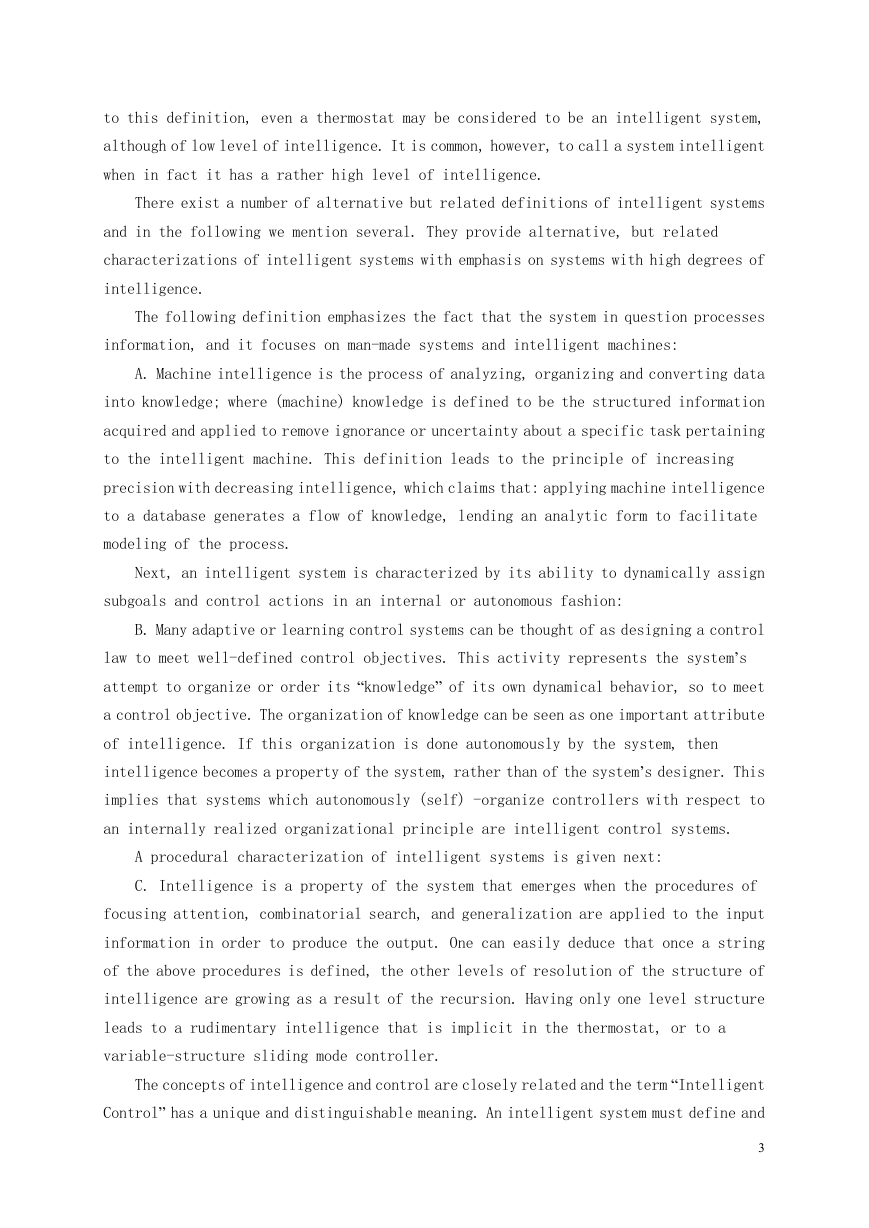
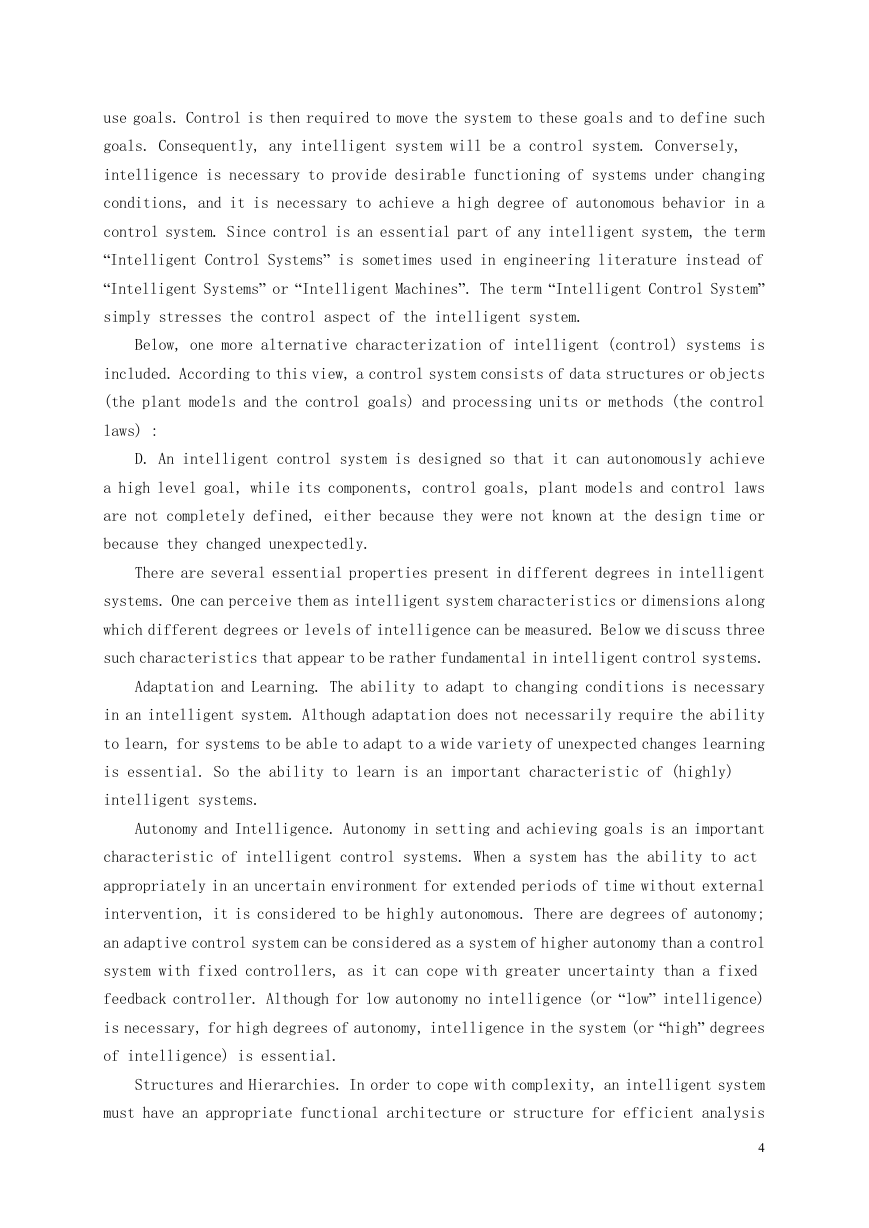
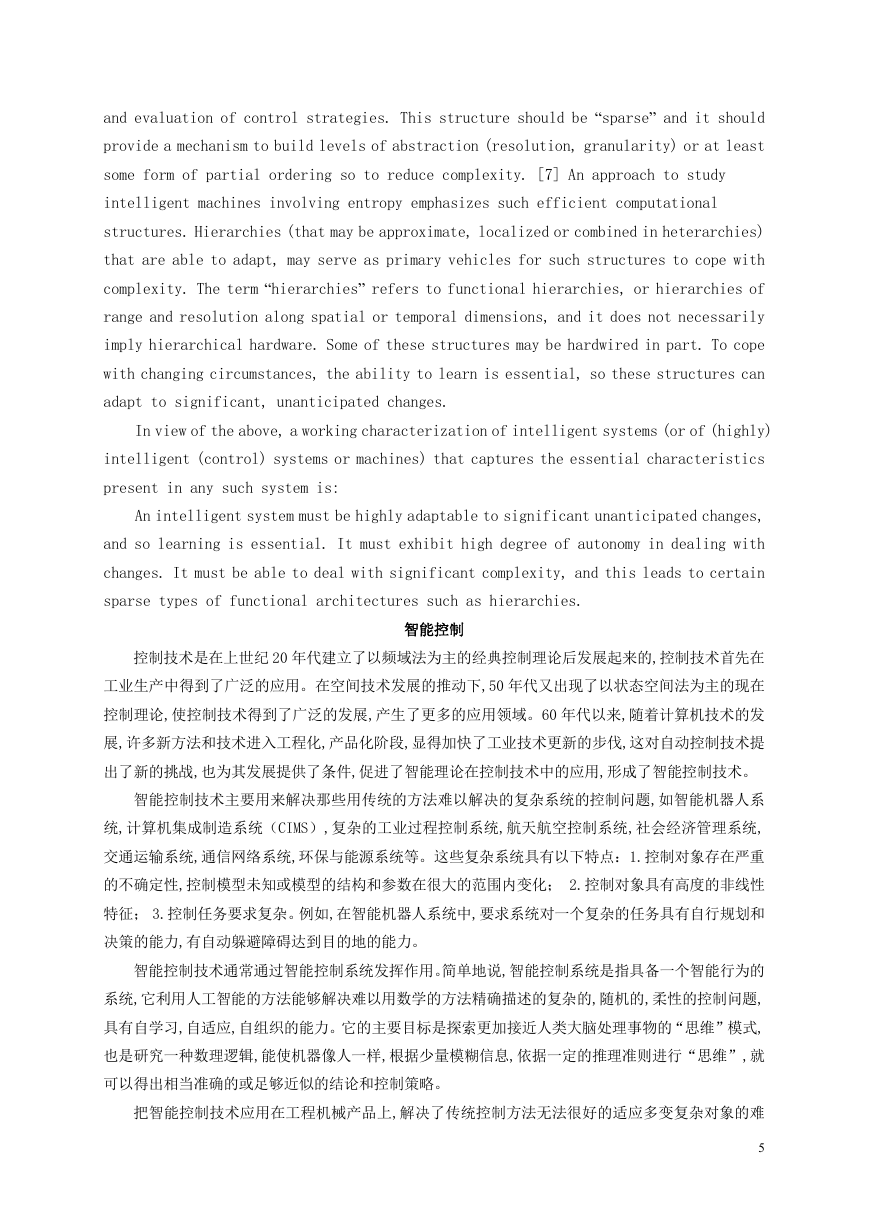
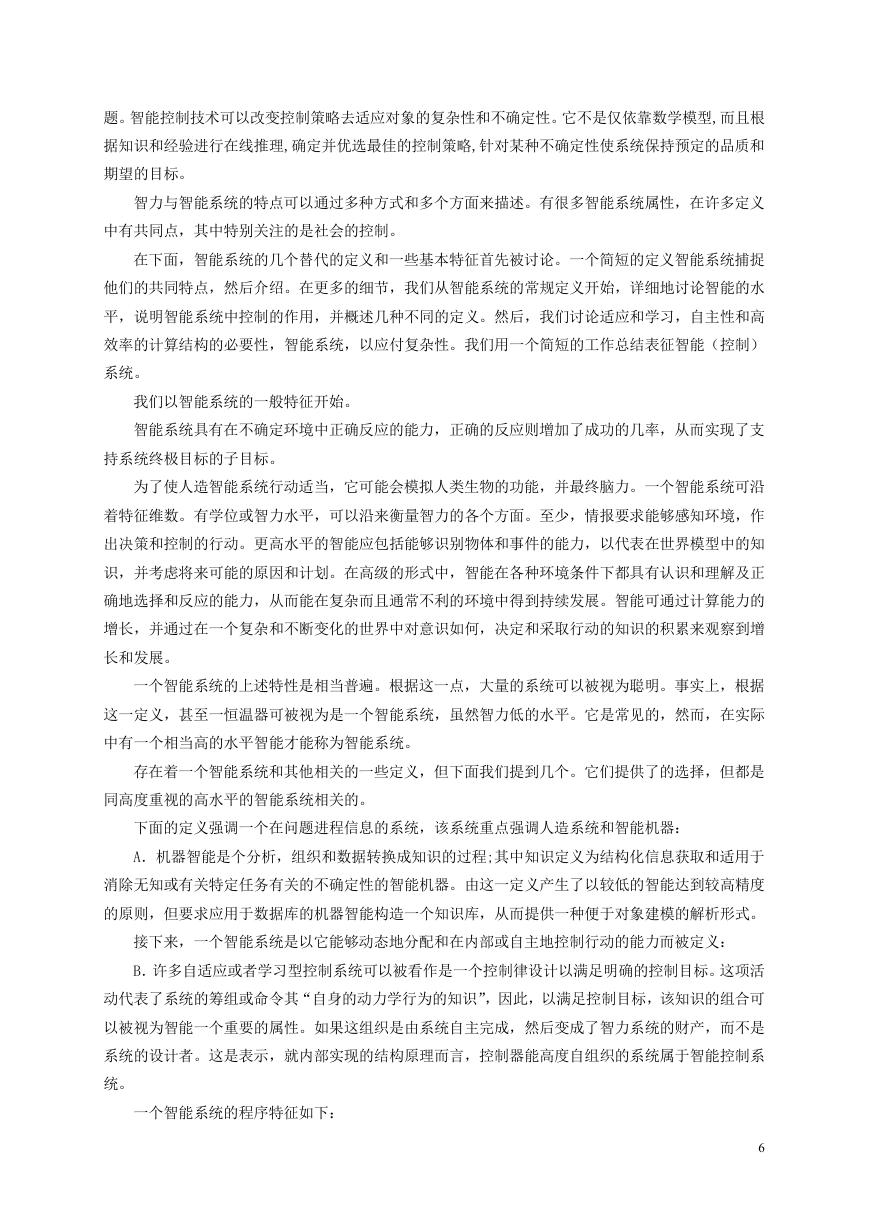
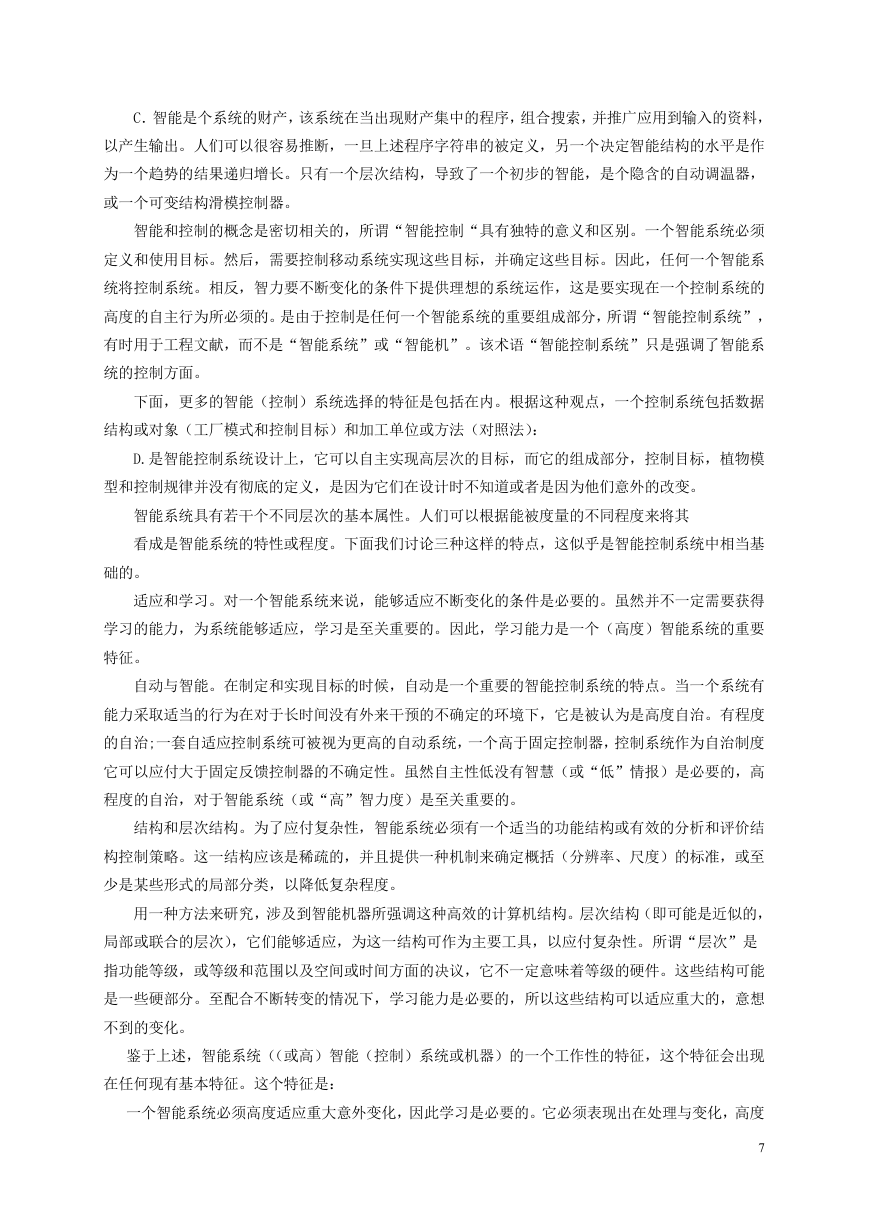








 2023年江西萍乡中考道德与法治真题及答案.doc
2023年江西萍乡中考道德与法治真题及答案.doc 2012年重庆南川中考生物真题及答案.doc
2012年重庆南川中考生物真题及答案.doc 2013年江西师范大学地理学综合及文艺理论基础考研真题.doc
2013年江西师范大学地理学综合及文艺理论基础考研真题.doc 2020年四川甘孜小升初语文真题及答案I卷.doc
2020年四川甘孜小升初语文真题及答案I卷.doc 2020年注册岩土工程师专业基础考试真题及答案.doc
2020年注册岩土工程师专业基础考试真题及答案.doc 2023-2024学年福建省厦门市九年级上学期数学月考试题及答案.doc
2023-2024学年福建省厦门市九年级上学期数学月考试题及答案.doc 2021-2022学年辽宁省沈阳市大东区九年级上学期语文期末试题及答案.doc
2021-2022学年辽宁省沈阳市大东区九年级上学期语文期末试题及答案.doc 2022-2023学年北京东城区初三第一学期物理期末试卷及答案.doc
2022-2023学年北京东城区初三第一学期物理期末试卷及答案.doc 2018上半年江西教师资格初中地理学科知识与教学能力真题及答案.doc
2018上半年江西教师资格初中地理学科知识与教学能力真题及答案.doc 2012年河北国家公务员申论考试真题及答案-省级.doc
2012年河北国家公务员申论考试真题及答案-省级.doc 2020-2021学年江苏省扬州市江都区邵樊片九年级上学期数学第一次质量检测试题及答案.doc
2020-2021学年江苏省扬州市江都区邵樊片九年级上学期数学第一次质量检测试题及答案.doc 2022下半年黑龙江教师资格证中学综合素质真题及答案.doc
2022下半年黑龙江教师资格证中学综合素质真题及答案.doc